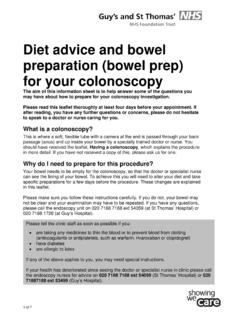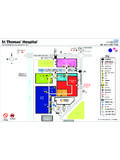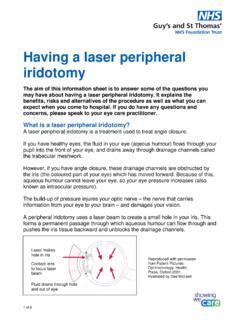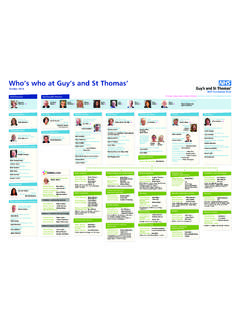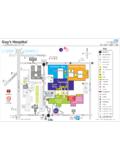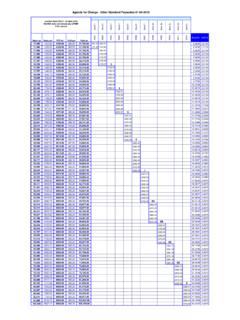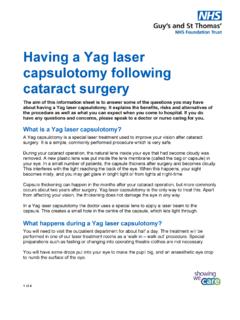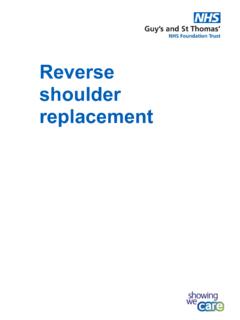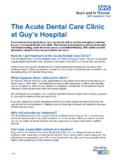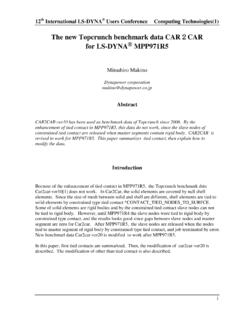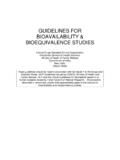Transcription of Having a skin biopsy - Guy's and St Thomas
1 1 of 3 Having a skin biopsy This leaflet explains what a skin biopsy is and the benefits and risks of this procedure. If you have any questions, please speak to a doctor or nurse caring for you. What is a skin biopsy and why do I need it? A skin biopsy is a routine investigation that helps us to diagnose skin conditions. It can also be used as a treatment to remove some abnormalities, such as moles. A biopsy is where a small sample of skin is removed under local anaesthetic in order for it to be looked at under the microscope. Local anaesthetic is a medication that numbs the specific area of the body so it is pain free, but does not put you to sleep. There are no alternatives to this procedure. It is the only way to get the information needed to make a correct diagnosis. Before your biopsy Please let the staff looking after you know if you are taking any antiplatelet medicines (such as aspirin or clopidogrel) or any anticoagulant medicines (such as warfarin or rivaroxaban).
2 Although taking these medications increase the risks of bleeding and bruising we do not recommend you stop taking any of these medications. If you are taking warfarin, please visit your local warfarin clinic two to three days before your surgery date and have your INR checked. If it is below 2 or above , please contact the dermatology clinic, as your biopsy date may need to be rearranged C(ontact details at the end of this leaflet). Please let us know if you have any allergies to medications including local anaesthetic, or if you are planning to travel within two weeks after your biopsy , as this will affect arrangements for removing your stitches (if you have them). Some people experience light-headedness after their biopsy . You must not drive to your appointment, and should have someone to accompany you home.
3 You can eat and drink as normal before your appointment. Consent asking for your consent We want to involve you in decisions about your care and treatment. If you decide to go ahead, you will be asked to sign a consent form. This states that you agree to have the treatment and you understand what it involves. If you would like more information about our consent process, please speak to a member of staff caring for you. 2 of 3 What happens during my skin biopsy ? The biopsy will be performed by a doctor or specialist nurse. We will give an injection of local anaesthetic to the area where the biopsy will be taken. This may sting for a few seconds, but then the area will be numb. You may feel pulling or pressure on the area when we take the biopsy , but it should not be painful. We will take a sample of tissue by cutting or scraping your skin .
4 We may have to take more than one biopsy , depending on your circumstances. If we close your wound(s) with stitches, you will need to have these removed at your GP surgery. The whole procedure is usually completed within 30 minutes. What happens after the procedure? A nurse will dress your wound and explain how to look after it at home. Make sure you receive a separate aftercare information sheet before you leave hospital. If you have stitches, your nurse will also discuss arrangements for their removal, and will give you a letter to give to the nurse at your GP practice. You will be able to leave hospital as soon as you feel well enough, and can eat and drink as soon as you wish. Will I have any pain or discomfort? The local anaesthetic will begin to wear off about 30 to 40 minutes after the operation. If you experience any discomfort from your wound, you can take simple painkillers such as paracetamol to help with this.
5 Always follow the instructions on the packet and never take more than the recommended dose. Check that the painkillers will not react with any other medicines you are taking. If you are unsure or if you have allergies to any medicines, speak to your pharmacist. What are the risks? We will discuss the risks with you in detail before we ask you to sign the consent form. Short-term risks include infection, bleeding and swelling of your wound. Although the biopsies taken are not large, you will have a small scar. Will I have a follow-up appointment? We will arrange a follow-up appointment, where the results of your biopsy will be discussed with you. 3 of 3 Pharmacy Medicines Helpline If you have any questions or concerns about your medicines, please speak to the staff caring for you or call our helpline.
6 T: 020 7188 8748, Monday to Friday, 9am to 5pm Your comments and concerns For advice, support or to raise a concern, contact our Patient Advice and Liaison Service (PALS). To make a complaint, contact the complaints department. t: 020 7188 8801 (PALS) e: t: 020 7188 3514 (complaints) e: Language and accessible support services If you need an interpreter or information about your care in a different language or format, please get in touch. t: 020 7188 8815 e: NHS 111 Offers medical help and advice from fully trained advisers supported by experienced nurses and paramedics. Available over the phone 24 hours a day. t: 111 NHS website Online information and guidance on all aspects of health and healthcare, to help you take control of your health and wellbeing. w: Get involved and have your say: become a member of the Trust Members of Guy s and St Thomas NHS Foundation Trust contribute to the organisation on a voluntary basis.
7 We count on them for feedback, local knowledge and support. Membership is free and it is up to you how much you get involved. To find out more, please get in touch. t: 0800 731 0319 e: w: Contact us If you have any questions or concerns about your biopsy , please contact Guy s Dermatology Outpatient Department, t: 020 7188 6418, Monday to Friday, 9am-5pm. This is not an emergency service. The Dermatological Surgery and Laser Unit (DSLU) at St Thomas Hospital offers an answer phone service, t: 020 7188 6284, Monday to Friday, 9am-5pm. Please leave a message with your name and telephone number and someone will get back to you as soon as possible. This is not an emergency service. In an emergency, please contact your GP or go to your local Emergency Department (A&E). For more information leaflets on conditions, procedures, treatments and services offered at our hospitals, please visit w: Leaflet number: 1680/VER10 Date published: January 2019 Review date: January 2022 2019 Guy s and St Thomas NHS Foundation Trust A list of sources is available on request Our values: Put patients first | Take pride in what we do | Respect others | Strive to be the best | Act with integrity
